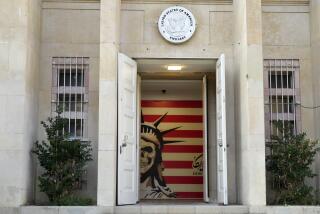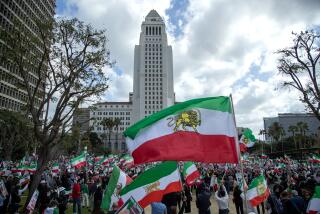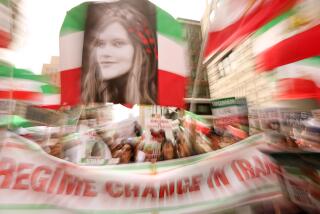Like Obama, Iranâs president talks of improving ties
TEHRAN â In some of his most conciliatory remarks to date, Iranâs president said Tuesday that Tehran is prepared to talk with the United States but gave no indication that negotiations might yield changes to the Islamic Republicâs nuclear program or support of militant groups opposed to Israel.
President Mahmoud Ahmadinejad, calling his nation âa superpower,â spoke at what observers described as a huge rally at Tehranâs Freedom Square commemorating the 30th anniversary of Iranâs Islamic Revolution.
He spoke just hours after President Obama told reporters at his first prime-time news conference since taking office that his administration âwill be looking for openingsâ with Iran that âwill allow us to move our policyâ in a new direction.
âItâs clear that the Iranian nation will welcome genuine changesâ to U.S. policy, Ahmadinejad said in a speech broadcast on national television. âThe Iranian nation is prepared to talk. However, these talks should be held in a fair atmosphere in which there is mutual respect.â
In a Jan. 28 speech, Ahmadinejad said the United States would have to end its support for Israel and apologize for alleged crimes before Tehran would improve ties with Washington. He made no mention of such preconditions Tuesday.
He criticized Israel and Iranian opposition groups based abroad as âterrorists,â but also said he was willing to cooperate with the U.S. on matters of mutual interest, including working to stop drug trafficking and terrorism. âIf you truly want to fight terrorism, come and cooperate with the Iranian nation, which is the main victim of terrorism, so that terrorism is uprooted,â he said.
In a gesture hailed by Tehran, the Obama administration recently designated as a terrorist organization the Iraq-based Kurdish militant group PEJAK, which had been fighting Iranian military forces for about five years. Iranian and Iraqi officials have said they suspected the group was receiving covert U.S. aid under the Bush administration.
At his news conference Monday night, Obama urged Iran to stop its financial support for the militant groups Hezbollah in Lebanon and Hamas in the Gaza Strip and âto send some signals that it wants to act differently.â
Observers here said a persistent media campaign, as well as furor over the recent Israeli offensive against Hamas, helped whip up public sentiment and attract the huge crowds. Posters commemorating the Gaza conflict, as well as paintings by schoolchildren and colorful banners, lined nearly 10 miles of roads converging on Freedom Square.
Large companies and government agencies set up parade stands, where they broadcast patriotic and religious music as well as hip-hop-inflected pop tunes and handed out free juice and snacks to passersby.
The crowd included men in traditional gray suits and women enveloped in black chadors, as well as young women in go-go boots and form-fitting overcoats and teenagers wearing jeans and running shoes.
A man on a stage performing something akin to a break dance drew a group of black-clad Basiji militiamen.
âGod is great!â the marchers chanted. Ayatollah Ali âKhamenei is our leader.â
Marchers enthusiastically chanted âDeath to Israel!â and âDeath to America!â One pulled along a donkey clad in Israeli flags, and a pair of performers dressed like demons in top hats with the flags of Israel and the U.S. wrestled each other on a parade float.
Attendees typically lampoon U.S. presidents with grotesque puppets and caricatures. But there were few if any such displays deriding Obama. Though Ahmadinejad heaped venom on the presidency and policies of George W. Bush, he refrained from saying anything negative about Obama.
Those at the rally said they welcomed friendlier ties with the U.S., as long as the relationship did not resemble what many described as Iranâs subservience to Washington under Mohammed Reza Shah Pahlavi, who was deposed in the 1979 revolution, in which Ayatollah Ruhollah Khomeini declared Iran an Islamic republic.
âWe want to have relations with the U.S. and donât want conflict,â said Reyhaneh Rahcham, a 16-year-old high school student wrapped in the flag of Iran. âBut we donât need America. We donât need their support for what we do.â
Another high school student, Omid Jalali, said, âWe want friendly relations with America, but we donât want to be its slave.â
--
Mostaghim is a special correspondent.
--
latimes.com/world
Historical photos of the Islamic Revolution and current photos of the celebration.
More to Read
Sign up for Essential California
The most important California stories and recommendations in your inbox every morning.
You may occasionally receive promotional content from the Los Angeles Times.










